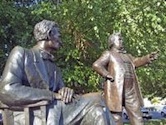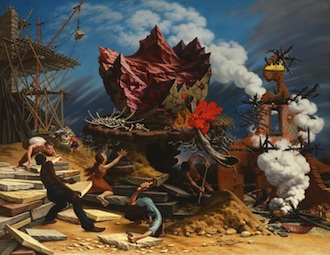Mr. Schock -- Theory of Wealth - Table of Contents
Labels do not disclose the ingredients
Often the ideological have a real lust for the labeling of people into sociopolitical categories. Categorization of people as liberal, socialist, fascist, Christian, etc. pervade our discourse. Yet these terms are used without regard to their actual definitions. When I call myself a Christian it is sufficient proof for some to dismiss me as a narrow-minded bigot. I consider essential to being Christian the expression of love for others, but some people calling themselves Christian want to lock gays up in internment camps. Labels are often misapplied even in describing one's own stance or philosophy. In the channels of chattering frenzy the careless use of labels make the terms meaningless. (What is media, if not chattering channels? radio, tv, newspapers, blogs, tweets, likes, or comments, isn't it all one?)
The Chicago Art Institute has this Peter Blume painting on display, click painting to get official history. If we all look at it and make our own description we take the artist's intended message and make sense of it in our own way. Interpreting people by label is much the same, more what I bring to the painting than what the artist intended.
The labels used often exemplify conflation. American discourse has made the terms fascist, socialist, and communist almost indistinguishable. Common usage seems to be ascribing a perception of authoritarian-ness. Both Nazi Germany and Soviet Russia were totalitarian states, both were our enemy, and we often say Democracy prevailed. We do not say capitalism prevailed, we had our most socialist economic system during World War Two. Socialism also gets thrown in with fascism and communism, but American usage seems to be about the authority of the state not economics. Obama is a socialist, an often hurled epithet, is spoken in the same breath with re-elect Obama and he will take your guns. In the Tea Party age government existing in any form is called socialism, except for the forms of government that serve the Tea Party.
Most Americans if not academically well read about these labels, have common beliefs that academics could classify. Few Americans are socialists, communism is almost extinct in the United States of the 21st century. The vast majority of Americans hold beliefs within the tradition of classical liberalism. The partisan blurring of liberal as a term of derision to describe Democrats means few will claim being a liberal. Essentially all Americans are liberals, some classical, some neo-liberal, some social-liberals, but our beliefs fit most closely to an academic definition of a liberal tradition. If we are all liberals, aren't we different? Aren't Keynesians socialists? Americans have never sought a planned economy a hallmark of socialism. We have always used government to help guide social development. We are not intersted in true socialism, but the current attack of any government involement as socialism is simply war by usage, making terms Orwellian double speak.
We have seen rallies with people, in amusing garb of the late 18th Century, shouting about taking back our government. Demanding a return to the government envisioned by our founding fathers.




